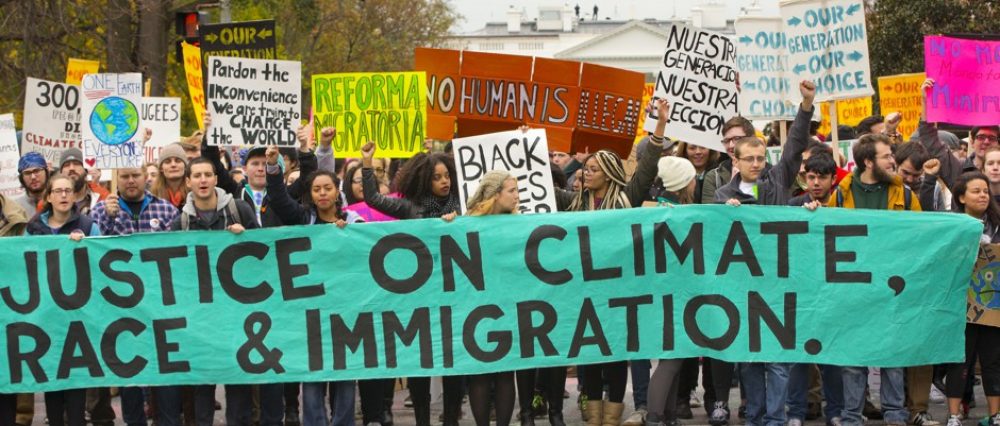In der Debatte über mögliche Umgangsstrategien mit der Klimakrise sind vor allem technische Lösungen und nationalstaatliche, lokale oder individuelle Handlungsmöglichkeiten präsent. Ergebnisse der Kohlekommission, Autofreie Innenstädte, vegane Ernährung, … ,,Wir alle sitzen (im Angesicht der Klimakrise) im selben Boot“ ist eine Phrase die häufig zu hören ist. Das ist schlichtweg falsch. Sowohl was die Verursachung der Klimakrise, als auch was die Betroffenheit von der Klimakrise angeht, sind Menschen je nach ihrem geographischen und sozialen Standort unterschiedlich positioniert. Das heißt es gibt einen sozialen und geographischen Unterschied, zwischen den Positionen, die am meisten zu den Emissionen und der Klimakrise beitragen und den Positionen, die am meisten von den Folgen der Klimakrise und dem verursachenden Raubbau an der Natur betroffen sind. Historisch gesehen trägt der Globale Norden1, insbesondere weiße und privilegierte Menschen und die kapitalistischen Strukturen in denen wir leben, maßgeblich zur Befeuerung der Klimakrise bei. Auch bei dem Umgang mit den Folgen der Klimakrise haben Menschen unterschiedliche Betroffenheiten und Ressourcen damit umzugehen.
Das Zitat am Anfang dieses Textes weist auf den Zusammenhang zwischen der globalen Ausbreitung des Kapitalismus und Rassismus hin. Die Verteilung der materiellen Grundlagen und damit einhergehenden Privilegien (Zugang zu Nahrung, sauberem Wasser, sicheren Wohnverhältnissen, politischen Entscheidungsprozessen) in der globalisierten Gesellschaft haben eine koloniale Vorgeschichte. Die Länder des globalen Nordens verschafften sich gewaltvoll Zugang zu den Ressourcen des Globalen Südens. Die ideologische Grundlage für diese Ausbeutung bildete die Entstehung des modernen Rassismus, durch den nicht weiße Menschen systematisch abgewertet wurden und werden. Die Ausbeutung hält bis heute an und das gewaltige Ausmaß dieser Zerstörung ist direkte Ursache der Klimakatastrophe. Eine klimagerechte Welt ist deshalb nicht ohne einen antirassistischen Ansatz erreichbar, der die kolonialen und kapitalistischen Grundlagen der Klimakrise, sowie unterschiedliche Betroffenheiten und Verletzlichkeiten durch die Klimakrise in den Blick nimmt.
Wir glauben, dass die wissenschaftliche Auseinandersetzung nicht ausreichend ist, und wollen Inhalte aus unserem universitären Lernprozess, daher für mehr Menschen zugänglich machen.
Aufbauend auf den Informationen, braucht es eine politische Praxis, die die Perspektiven von BIPoC, die jetzt schon von der Klimakrise betroffen sind und dagegen kämpfen, miteinbezieht, diese Kämpfe mitdenkt und unterstützt. Deswegen wollen wir auf dieser Seite auch Kritik bündeln die BIPoC an der weißen Klimabewegung üben und deren Forderungen aufgreifen.
In the debate on possible strategies for dealing with the climate crisis, technical solutions and nation-state, local or individual options for action are the most prominent. Results of the coal commission, car-free inner cities, vegan food, … “We are all in the same boat (in the face of the climate crisis)” is a phrase that is often heard. It is simply wrong. Both in terms of the cause of the climate crisis and the impact of the climate crisis, people are positioned differently depending on their geographical and social location. That means there is a social and geographical difference between the positions that contribute most to the emissions and the climate crisis and the positions that are most affected by the consequences of the climate crisis and the causing overexploitation of nature. Historically, the Global North1, especially white and privileged people and the capitalist structures in which we live, has been a major contributor to fuel the climate crisis. Also in dealing with the consequences of the climate crisis, people have to deal with different impacts and resources.
The quotation at the beginning of this text points out the connection between the global spread of capitalism and racism. The distribution of material resources and associated privileges (access to food, clean water, secure housing, political decision-making processes) in the globalized society has a colonial history. The countries of the Global North forcibly gained access to the resources of the Global South. The ideological basis for this exploitation was the emergence of modern racism, which systematically devalued non-white people. The exploitation continues to this day and the enormous extent of this destruction is a direct cause of the climate catastrophe. A climate fair world is therefore not achievable without an anti-racist approach, which takes into account the colonial and capitalist basis of the climate crisis, as well as different degrees of concern and vulnerability caused by the climate crisis.
We believe that the scientific debate is not sufficient and therefore want to make content from our university learning process accessible to more people. Our goal is to draw attention to racist aspects and colonial continuities in the climate crisis and the discourse about it by providing various sources for this purpose.
Based on the information, there is a need for a political practice that takes into account the perspectives of BIPoC, who are already affected by the climate crisis and fighting against it, and who thinks and supports these struggles. Therefore we want to bundle on this page the BIPoC criticism of the white climate movement and take up their demands. For example, the climate (justice) movement in Germany is largely presented and perceived as a white and European movement. Especially people in the Global South are already feeling the consequences of the climate crisis. In addition, indigenous groups have been campaigning for years against the capitalist overexploitation of nature, which fuels the climate crisis and threatens their own sovereignty and livelihood.
